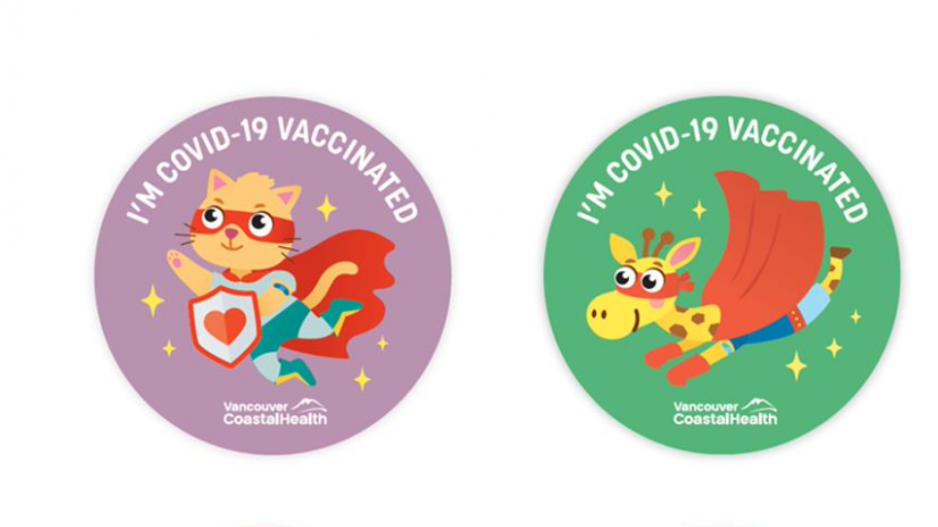B.C.’s 350,000 children between the ages of five and 11 can get start getting vaccinated against COVID-19 this Monday.
More than 90,000 children have been registered and invites will be prioritized based on the order they signed up through Get Vaccinated BC.
Those invites are expected to go out in the pre-dawn hours of this coming Monday and vaccinations will begin later in the day in clinic space set up to deliver the shots to younger children. The province is strongly discouraging drop-ins but is asking local health authorities to be flexible in some cases.
Health Canada approved COVID-19 immunizations for children five to 11 on November 19 and the first Pfizer Inc. vaccines arrived in Canada earlier this week.
B.C.’s deliveries are expected to arrive in the Lower Mainland later in the day, while it will take the rest of the week to reach the Northern Health and Interior Health regions as truckers navigate choked highway access following last week’s devastating floods.
Health Canada has recommended a two-dose regimen with a 21-day interval between jabs.
B.C. health officials will be following the National Advisory Committee on Immunization’s (NACI) recommendations of an eight-week interval.
Provincial health officer Dr. Bonnie has said repeatedly that the longer intervals offer stronger, longer-lasting protection over time. The vast majority of adults in B.C. received their doses at longer intervals.
But it also means that B.C. children will not be fully vaccinated in time for the holidays, when many families are expected to be gathering in large groups indoors. Dr. Penny Ballem, the executive lead for the immunization campaign, said she expects to have all children vaccinated by the end of January.
Last week the province administered 100,000 doses amid the ongoing booster campaign.
“We have created capacity … for the children’s vaccine and it will be opening it up,” Ballem said during a Tuesday briefing, adding more pharmacies will soon be administering booster doses to adults to take pressure off immunization clinics.
The Pfizer product has been specifically tailored for children, and consists of a 10-microgram dose compared with a 30-microgram dose for those ages 12 and older. The lower dose also means a reduced chance of an adverse reaction to the vaccine.
The vaccine was found to be 90.7% effective in the younger age demographic — similar to efficacy rates for older age groups.
Israel gave the OK to administering the Pfizer vaccine to children five to 11 last week, while U.S. authorities approved it earlier this month.
“To date, no safety issues have emerged from the use of Comirnaty [vaccine] in children five to 11 years of age in the United States, where over 2.5 million children have received their first dose,” Health Canada chief medical adviser Dr. Supriya Sharma said last week, using Pfizer’s official product name for the vaccine.
Amid the fall and winter seasons, when many Canadians are getting their flu shots, NACI is recommending children get their COVID-19 vaccine at least 14 days before or after another vaccine. This way, medical professionals can be sure whether any potential adverse reactions are related to the COVID-19 shot or another vaccine.
The province, however, said that while it expects most of the pediatric COVID-19 vaccines to be administered on their own, it won’t force recipients to wait 14 days.
Young recipients who get their first dose at age 11, and then turn 12 when it’s time for their second dose, will get an adult dose if they’re now 12 years old.
“None of these need to be repeated. They’re all valid doses,” Henry said when asked about the potential for some 11-year-olds to delay getting their first dose until they turn 12.
“But the short answer is: don’t wait.”
Pharmacies have been administering the adult COVID-19 vaccines to children 12-17, but they will not be administering vaccines for those five to 11.
Instead, younger children can attend all-age or family clinics. Quiet, private spaces will be offered to families who need them.
Most of the mass clinics that serviced the adult population earlier this year have since gone back to their original use. New child-specific clinics will also be opened to accommodate the latest immunization campaign.
Children five to 11 must get verbal consent from a parent or legal guardian accompanying them. If another adult brings them in for the shot, written consent and contact info from the parent or guardian must be provided.
Immunizers experienced with these younger age groups will be deployed to administer the jabs to that demographic, while other immunizers will continue administering vaccines to older age groups.
The First Nations Health Authority and local health authorities will come to the rural First Nations communities to offer vaccinations to children 5 to 11.
This will be done at the same time boosters are offered to adults as well as first and second doses to adults who also wish to get immunized. Health authorities are still working on scheduling.
The province also plans to embark on a public information campaign aimed at parents with questions about the vaccines.
Children under the age of 12 now make up about 20% of daily cases in B.C. as the Delta variant has increased the rate of transmissibility since this summer. Students have also returned to B.C. classrooms during the same period cooler weather is bringing more people indoors.
There have been 2,975 exposure notifications at 830 schools in B.C. between early September and November 13.
Up until November 6, there have been four outbreaks in B.C. schools, ranging in size from 35-62 cases. There have also been two other outbreaks since then, according to the province.
A total of 382 “clusters” of two or more cases have hit 217 schools across the province. Those clusters have ranged in size from two to 18 cases, with median size being three.
To date, there have been hospitalizations in B.C. of children 12-17 who have received at least one dose of a vaccine.





